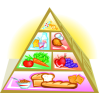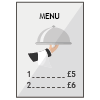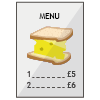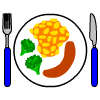Snack-tember: Activities and Teaching Ideas
Sept. 5, 2025
What is Snack-tember?
This year British Nutrition Foundation has changed Healthy Eating Week to Snack-tember, and it now runs for the whole month of September.
The purpose of Snack-tember is "to improve children and young people’s knowledge, skills, confidence and motivation, so that they can make and choose healthier, more sustainable snacks." The British Nutrition Foundation are focusing on snacks because these are foods that are more likely to be within a young person's control (as opposed to an evening meal that a parent may choose, shop for and cook).
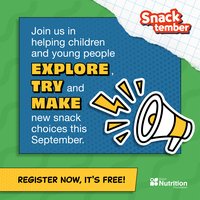
Why is Healthy Eating important?
A scoping review* investigating the patterns of snacking in children aged 2–12 years found that:
• Over 92% of children consumed snacks.
• On average they had 3 snacks a day.
• Snacks contributed 231-565kcal a day to the diet.
The study concluded that snacking plays a significant role in children's diets with multiple snacking occasions occurring throughout a child's day. Overconsumption of snacks has the potential to increase risk of childhood obesity.
- British Nutrition Foundation
Healthy eating helps with a range of physical and mental developments:
- Growth and development: Adequate intake of essential nutrients supports the growth of strong bones and muscles. Calcium and vitamin D are crucial for bone development, while protein helps in muscle growth (British Nutrition Foundation, 2023)
- Immune System: Vitamins A and C, found in fruits and vegetables, help strengthen the immune system, reducing the frequency of illnesses such as colds and infections (British Dietetic Association, 2023).
- Brain Function: Omega-3 fatty acids, particularly from oily fish, are vital for brain development and cognitive function. These nutrients support memory and learning capabilities (British Nutrition Foundation, 2023).
- Reduced Risk of Chronic Diseases: A balanced diet helps reduce the risk of obesity, heart disease, type 2 diabetes, and certain cancers in later life. Establishing healthy eating habits early can promote lifelong health (NHS, 2023).
- Academic Performance: There is evidence that children who eat a nutritious breakfast perform better academically. They have better concentration, memory, and cognitive functioning compared to those who skip breakfast (British Dietetic Association, 2023).
Currently, only 18% of children aged 5-15 in England meet the recommended 5-a-day intake of fruits and vegetables (Public Health England, 2021), and children aged 4-10 consume an average of 14% of their daily energy intake from free sugars, which is more than double the recommended limit of 5% (NHS, 2020). In the UK, about one in three children aged 10 to 11 are overweight or obese (GovUK).
Engage Children in Healthy Eating with The Fruities and Veggies™
Get ready to meet the freshest new characters in town - the Fruities and Veggies™ have officially landed with their very own book series, now available in the 2Simple Shop!
The fun-filled Fruities and Veggies™ are here to teach, entertain and inspire children through vibrant stories packed with adventure and important messages about healthy eating, kindness, and friendship.
Children will meet Arthur Apple, Betty Beetroot, Pete Potato and all their yummy friends in the short and sweet story books.
As well as the fun and engaging stories and illustrations, the Fruities and Veggies™ books also include free access to online activities. Buyers of the books will be able to use Purple Mash resources to:
- Plan a Healthy Meal
- Create a '5 a day' Leaflet
- Write a Smoothie Recipe
- Write a Healthy Food Song
- Paint a Character
- Solve a Healthy Eating Wordsearch
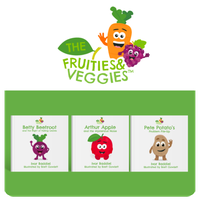
Purple Mash Snack-tember Activities
If you subscribe to Purple Mash you can find all our Healthy Eating resources here ▶▶▶
Start the week by introducing key information with the different food groups, exploring how much of each should be in a person's daily diet. Children could take it in turns to read the information in the help box, and then think of examples of food to go into each group.
Encourage children to make a healthier choice with with a Healthy Eating Plan. Younger students could work together to create a whole-class plan with the teacher as scribe. There are some great topics for discussion in the plan.
Plan for success by creating a Dinner or Lunch menu for each day of the week, with plenty of fibre and a different protein each time. Can children include non-meat proteins in their meals as a further challenge?
Across your school, you could set up a blog using 2Blog, allowing children to share their favourite family recipes, or create a Display Board where children can submit their favourite healthy meals, allowing students to 'Be the Chef'.
Move more with Striver
Our PE and wellbeing resource Striver is perfect for Healthy Eating week and will help pupils, teachers and parents to move more and get active together. Striver is a whole school (EYFS-Y6) scheme of work for PE written for non-specialists. The lessons are easy to follow and include images and extension activities making it accessible to teachers from all backgrounds. Simple one-touch assessment makes progress tracking quick and easy.
The PE and wellbeing app includes 6 wellbeing units that focus on mindfulness, nutrition and the importance of sleep. The units aim to boost self-esteem and build resilience that children study at increasing levels of depth as they move up through the school. This reinforcement process has been designed so that by the time children leave your school, they not only understand these topics but can put what they have learned into practice in a meaningful way.

Striver also helps you to tick all the boxes for improving sport and PE in your school and ensures you have used your Sport Premium money to create a legacy of sport in your school. Find out how with our free guide.
